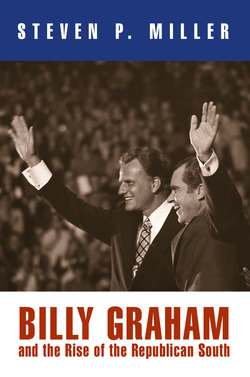Billy Graham and the Rise of the Republican South

Реклама. ООО «ЛитРес», ИНН: 7719571260.
Оглавление
Steven P. Miller. Billy Graham and the Rise of the Republican South
Отрывок из книги
POLITICS AND CULTURE
IN MODERN AMERICA
.....
Graham thus suggested how the first two decades of conflict between the United States and the Soviet Union simultaneously expanded and limited the national discourse on civil rights. The United States Information Agency and similar governmental outlets sought to advance America's image as the leader of the free world. Such efforts (in the words of one legal historian) made “civil rights reform…in part a product of the Cold War.”47 Southern conservatives, to be sure, eventually launched a “southern red scare” that readily merged rabid domestic anticommunism with opposition to altering the racial status quo.48 Graham, though, increasingly viewed the Cold War through an international lens, even while he remained on friendly terms with many southerners who clearly (or conveniently) viewed civil rights activism as a front for communist subversion. By the latter half of the 1950s, Graham routinely linked anticommunism with a critique of segregation. The nation, he declared in 1957, resided “in a fish bowl with the whole world looking in,” and “our racial tensions are causing some of the people of the world to turn away from us.”49
In keeping with his move toward a more nuanced understanding of the Cold War, Graham gradually cultivated a clear, if adaptable, declaration of racial moderation.50 His status as a religious celebrity who was also a southerner made his decision to address the race issue at some level not entirely surprising. Less predictable was his public position, at a reasonably early date, as a moderate desegregationist. When he occasionally addressed racial matters while speaking in the South during the early years of his ministry, his comments were limited in nature. At a 1950 crusade in Columbia, South Carolina, he flatly declared that “revival will also solve the race question by causing both races to be fair toward each other.”51 Graham team member Grady Wilson explicitly defended the residual nature of this formula. “What's the point of attacking a cause when you're after sinners?” Wilson asked an interviewer that same year. “If a man's a sinner and he's a member of the Ku Klux Klan, we're not going to lose the chance of saving him by attacking the organization he belongs to.”52
.....